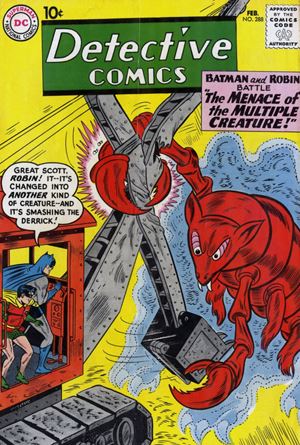Is the Comic Book Industry Approaching an Implosion?
By Philip Schweier
November 7, 2014 - 10:34
Recently on Facebook someone posted: “Is it just me, or does anyone else feel we're witnessing the apex of comic books and the industry is poised for another implosion like we saw in the ‘90s?” This led to a spirited debate regarding the future of the industry, as the price point of monthly titles continues to climb, and readership continues to dwindle.
 |
| Cartoonist Windsor McKay's Gertie the Dinosaur, from her 1914 film |
But it’s a symbiotic relationship. Hollywood is able to capitalize on an established fan base in return for the lion’s share of the profits from a successful adaptation. In return for providing fodder for movies and TV, the comic book publisher enjoys a revenue stream as properties are optioned for film and television.
Publishers who are affiliated in some way with the film industry will argue that Hollywood productions help bring their properties to the main stream, and are thereby creating a new audience for the monthly titles. Perhaps, but I doubt it is as effective as they would lead you to believe.
Many filmgoers might appreciate the vaguely familiar characters, but are unwilling to commit to the overall backlog of sometimes contradictory story arcs and ever-changing supporting characters. Publishers have tried to add gravitas to their properties over the past 30+ years, but this can sometimes send the mildly curious fan screaming in the opposite direction.
 |
| Perhaps it was called the Silver Age because comic books only cost a dime. |
In the past, I’ve suggested a possible solution: Comic book publishers could reach into their archives for some of the better single-issue stories, and republish them in a cheaper format (digest?) at a much lower price point, to be sold in Wal-Marts, Krogers and Walgreens.
True, the films help to spike the readership of a specific title, but I don’t believe these are necessarily new comic book readers climbing aboard. I suspect it’s mostly established fans adding another title to their pull lists. What I have seen is newer fans buying the occasional graphic novels in Barnes & Noble, rather than the ongoing monthly titles.
For the dedicated comic book reader, the success (or failure) of such projects impacts the rack at their local comic shop. The popularity of the X-Men, Avengers and Batman films has led to multiple titles. I would expect this to dilute the market somewhat. Instead of robust sales on one or two titles, the audience is split, and publishers end up with moderate sales on four or five titles.
 |
| Did the Catwoman movie impacts sales of the comic book? |
Many would agree the relationship between the Hollywood and the comic book industry has never been so strong as it has been over the past decade. DC Comics and Marvel Comics are owned by Warner Bros. and Disney, respectively. As such, it should be no surprise that these by two media juggernauts should mine their corporate siblings for viable (i.e., profitable) film franchises.
So what happens when the honeymoon is over, and movie screens are saturated with, shall we say, properties of limited appeal? That limited appeal translates to lost revenue, and eventually a diminished relationship. It’s possible the publishing companies will cease to exist as individual companies. Instead, they may become an imprint of the publishing houses of their corporate parents.
The original poster added: “I strongly believe we'll always see Batman, Superman, Spiderman (sic) and more. …What we won't see are books and titles, and graphic novels, and (comic book) stores like we know them now. The industry will get knocked off its feet. Maybe it recovers. Maybe it doesn't.”
 |
| Despite the demise of pulp magazines, fans of The Shadow can still enjoy his advetures. |
A.) the comic book industry does NOT collapse, but there is an inevitable backlash, such as a general belt tightening by publishers.
B.) the comic book industry collapses, and its various properties are dispersed into other lesser venues, such as video games, animation, etc.
A collapse is doubtful, but certainly an evolution is to be expected. My two cents worth in the discussion was, “Many forms of entertainment have a shelf life. Pulp magazines, opera, square dancing, etc. They evolve into niche hobbies.”
Or, in the case of radio, it evolves into an entirely different market. In the late 1940s, as radio programs moved to television, radio could have easily died, but instead it capitalized on the music industry.
In my opinion, evolution is not necessarily a bad thing, even if comic books return to being a niche hobby. I’ve always believed it’s better to do something small and do it well, rather than get overly ambitious and end up with an overblown catastrophe. With that philosophy in mind, I’d rather see a smaller, healthier industry, instead of a bloated monster vomiting up entire forests of comic books that are mostly crap.
Related Articles:
DC Implosion, 2.0, part 2: Speculating on the Future
DC Implosion, 2.0, part 1: Evaluating the Past
Comic Book Industry Implosion Redux? Try Again
Is the Comic Book Industry Approaching an Implosion?
